Irish Utopia
At least the headline in the week's Mail on Sunday, 'Peace in Ireland?', had a question mark attached to it: when the present editor of that paper, Stuart Steven, was involved in a famous exclusive on the Daily Express, no doubts were allowed to taint the bogus claim that Martin Bormann had been discovered in South America. Doubts about any report that 'a settlement of the Ulster problem' is imminent are, of course, more than justified. There is no possible settlement which would satisfy both the Unionists and the IRA. It is foolish even to suggest that somewhere there exists a 'solution', an Irish Utopia, if only men of good will could find it. There exists only a range of policies, on subjects like security and local government, which may be expected to ameliorate matters or make them worse. Even at the official level, where hope sometimes triumphs briefly over experience (the recent rumours may emanate from enthusiastic junior officials in the Irish Ministry of External Affairs, excited by Dr Fitz- gerald's mention in London of a 'new political structure' for Northern Ireland), Dublin and London are still far from devising even the pretence of a settlement. Dublin wants the right to participate directly in running the affairs of the pro- 'I suppose he was running out of comrades here.' vince. London is prepared to concede a great amount of `consultation', but no executive participation. Last November Mrs Thatcher rejected all proposals for constitutional change advanced by the New Ireland Forum. Unionist fears were quietened. Now they have been re- aroused, which will please the IRA, make the life of moderate politicians in Northern Ireland still harder, and reduce the hope that some real, albeit nrfodest, good might flow from co-operation between the two national governments.














































 Previous page
Previous page